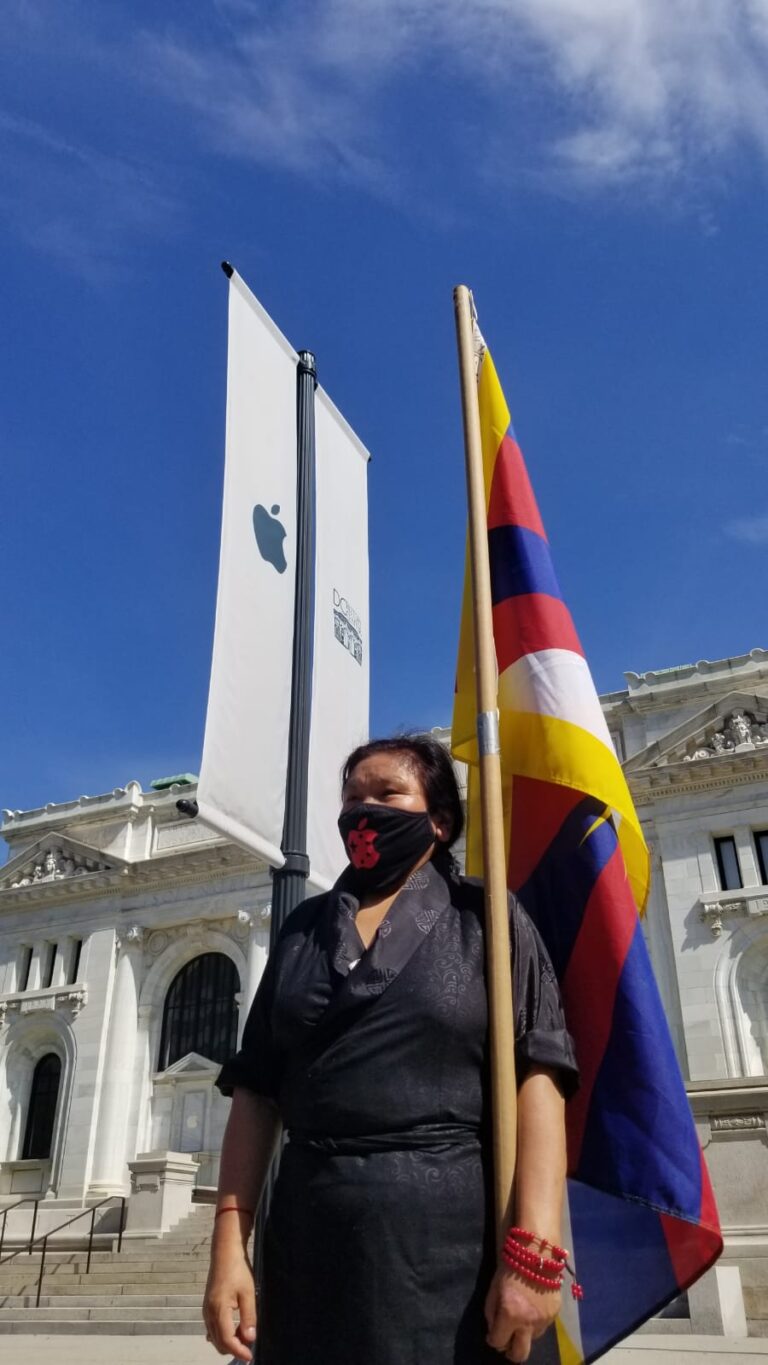For Immediate Release – Thursday, 30th July 2020
Contact:
Jon Date: jon.date@digacommunications.com / +44 (0) 7533 011983 (based in London);
Vicky Wyatt: vicky@sumofus.org / +1201 733 8503 (based in San Francisco); or
Dorjee Tseten: dorjee@studentsforafreetibet.org / +1(646)753-3889 (based in New York City – available for English and Tibetan language interviews)
Tibetan, Uyghur and other activists protested outside Apple’s flagship store in the Carnegie Library, Washington D.C., on Thursday, in a campaign organised by the international consumer group SumOfUs and Students for a Free Tibet. The protest follows Apple CEO Tim Cook’s appearance before Congress yesterday, and comes ahead of the publication of Apple’s Q3 2020 financial results later today.
The activists wore face masks with the Apple logo morphed to look like a Chinese Communist Party logo, and stood silently to represent how they were being silenced by Apple’s censorship in China. They stood with signs calling for Apple to protect free speech and human rights.
Apple has deleted over 1,000 Virtual Private Networks (VPNs) from its China App Store at the request of the Chinese Communist Party in recent years, leaving Tibetans, Uyghurs, Hong Kongers and other human rights defenders unable to protect themselves from government surveillance and repression. The campaigners expressed their solidarity with the people of Hong Kong as the draconian National Security Law is implemented.
Sondhya Gupta, Campaigns Manager at SumOfUs, said: “In opening a store in the Carnegie Library, Apple has made quite a statement. However, far from securing freedom of expression and access to information for all its users, it is removing news, podcast and VPN apps at the behest of the government of China. And that government is so emboldened by years of coddling by corporations like Apple, it is expanding its unprecedented censorship machine and actually removing books from libraries in Hong Kong.”
Pema Doma, Campaign Director, Students for a Free Tibet, said: “As the second most valuable company in the world, Apple is undeniably a leader in establishing global norms around technology and innovation. Apple’s actions today will impact the privacy and digital security of billions of people for generations to come, especially in places like Tibet that are ruled by authoritarian regimes. If Apple wants to be recognized as a responsible global leader, it needs to start respecting the rights of all its consumers and stop kowtowing to dictators.”
Irade Kashgary from the Uyghur American Association, who attended the protest, said: “Companies like Apple can’t continue to claim to the American public and Congress that they support freedom and privacy, whilst at the same time enabling the Chinese Communuist Party’s surveillance and oppression.
“We ask that everyone speak up against companies that suppress freedom of expression in China. As we stand here beside allies who have also faced immense persecution at the hands of the CCP, we trust that our voices are getting stronger and louder, as we continue to work together so that censorship and oppression will never be tolerated in China or internationally.”
Notes:
Notes to editors
- Photos of the protest are available here: https://bit.ly/2Djif0R
- The CEOs of Apple, Facebook, Twitter and Google appeared before the House of Congress Judiciary Antitrust Subcommittee yesterday (Wednesday 29 July.)
- Apple’s Q3 2020 financial results at 5pm Eastern Time today (Thursday 30 July.) Details are available here.
- Over 135,000 people have signed SumOfUs’s petition calling for Apple to stop blocking VPNs in China and to uphold freedom of expression.
- Over 40% of Apple investors supported a proposal at the company’s shareholder meeting in February put forward by SumOfUs, nearly forcing the company to put policies in place to safeguard freedom of expression, and be more transparent in how it responds to requests from the Government of China. More information on the proposal is available here.





